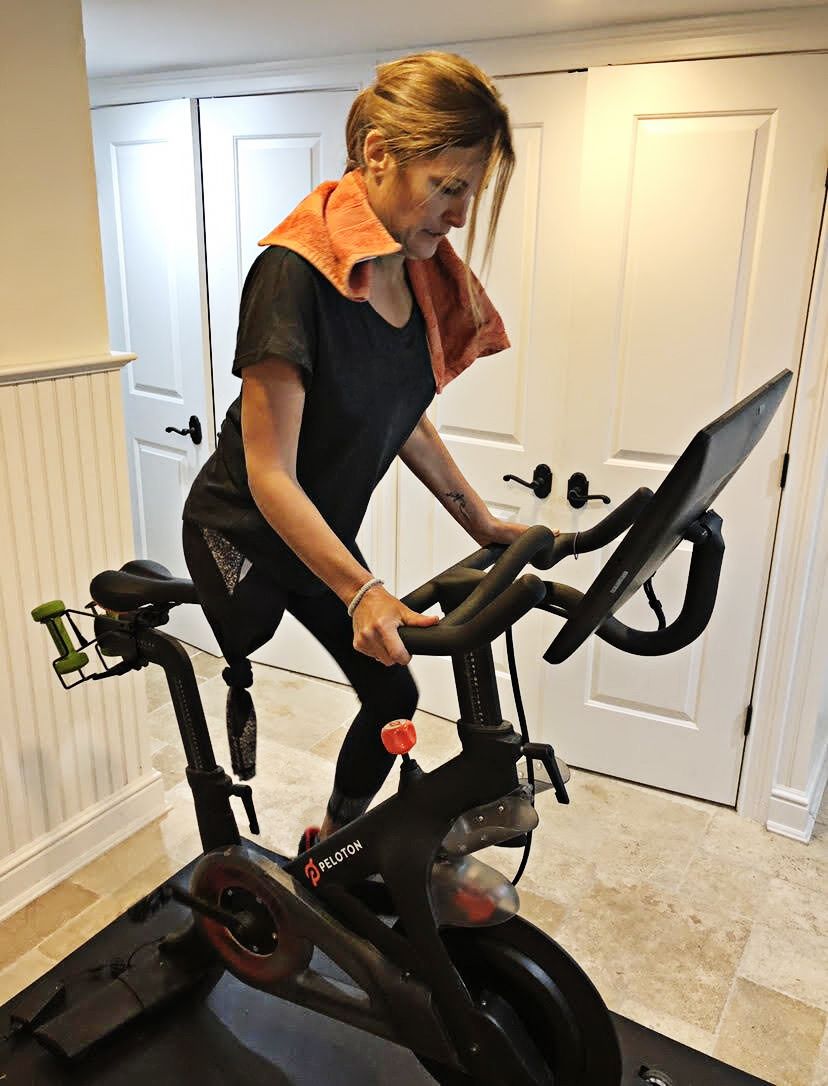
Uniting In Strength
Get to know some of the Peloton members who work out together under Tags like #DisabilityStrong and #MentalHealthWarriors.
By Team Peloton•
Kristin H.
Alia M.
Scout Bassett
Tamra S.
Sammie B.
Katie G.
Brenda A.
International Day of Persons with Disabilities
The Peloton community is brimming with Members of all backgrounds, identities, and lived experiences. You may have noticed Members riding, running, or training on the App with the Tag #DisabilityStrong or #MentalHealthWarriors. Members in Tags like these each have their own unique fitness motivators and favorite instructors, but they unite around the joy of getting stronger together and celebrating each other’s successes. In honor of International Persons with Disabilities Day, we spoke with Peloton Members with disabilities to hear about their experiences and fitness journeys as part of the Peloton community and in life.
If you’d like to provide feedback on any of Peloton’s accessibility features or participate in future usability testing with our research team, please reach out to accessibility@onepeloton.com for more information.
Kristin H.

What is your personal workout philosophy?
No matter what the feeling or goal of the day is, just hop on the Peloton Bike for even a few minutes. Ultimately they will turn into more than a few, and something is better than nothing.
How has Peloton impacted your relationship with your physical and mental health?
Being active impacts my well-being as a compliment to the mental part of focus and fitness. One can’t exist as effectively without the other, and it’s the balance of mind and body that equals well-being. Peloton has impacted my relationship with my physical and mental health by demonstrating from the very start of a ride the interconnect-ability of the two. The instructors are not only trainers but also coaches who feel like friends too.
Can you think of a time when an instructor said something that really stuck with you?
There have been many times when an instructor has said something that really sticks with me. Most recently, in her Arms & Upper Body Strength class, Tunde said, “Cheers to celebrating your body exactly where you’re at.” When your body has changed from what you’ve known it to be, or is different than other bodies, this is an important reminder. In Leanne Hainsby’s recent Tabata Ride, she expressed a similar thought: “Modify, no problem—giving up, problem.”
What’s something that’s surprised you about Peloton?
How involved the community really is with one another, although as an entirely customizable experience. I also didn’t realize how much the Instructors would add to my Spotify list! No surprise, however, as music is spiritual, and spirituality is another component to overall well-being.
What accessibility efforts that Peloton has made have the most impact on you?
Because you don’t have to leave your home to use it, Peloton is accessible. You are in your own space, but you also know you have access to something much bigger. When I think I want to take that option of quitting, knowing that I can turn on the screen and someone is there who will talk me out of it is key. Every moment after that is an opportunity to take myself just one step further; making it through each next moment of physical exertion sets me free mentally. My motto of physical and mental fitness: It’s done better with the help of others.
How involved the community really is with one another, although as an entirely customizable experience. I also didn’t realize how much the Instructors would add to my Spotify list! No surprise, however, as music is spiritual, and spirituality is another component to overall well-being.
Alia M.
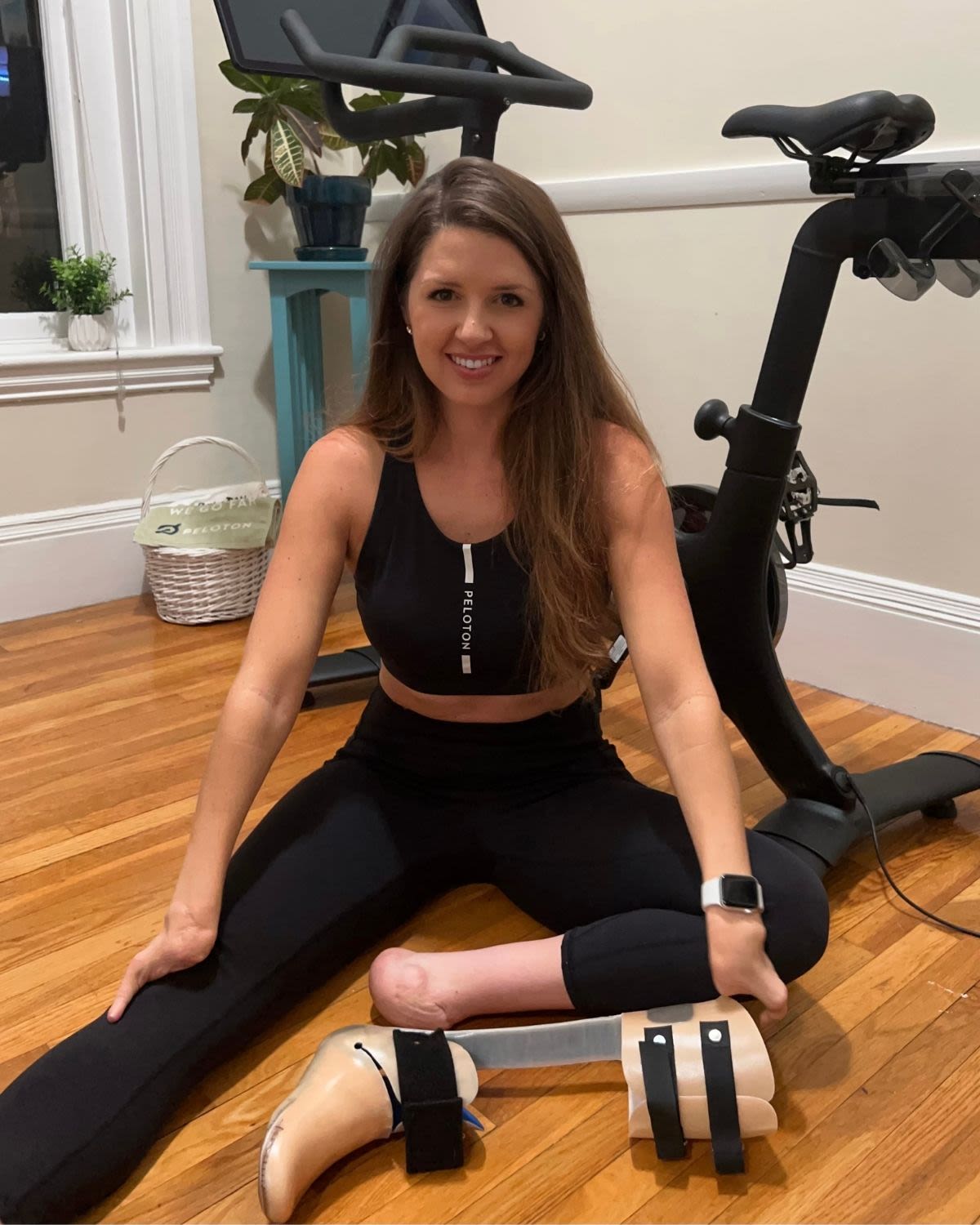
What is your personal workout philosophy?
Be proud of everything your body can do, even if it cannot do what someone else’s body can.
How has Peloton impacted your relationship with your physical and mental health?
Being active grants me an opportunity to become more familiar with my ever-evolving capacity for physical and mental stressors, and that understanding guides—and at times, encourages—me as I move through the ups and downs of life.
As a left-foot amputee, cycling completely changed the way I could exercise. It allows for an outstanding cardiovascular workout while causing minimal stress on my residual limb. When my cycling studio closed during COVID, I felt an immediate loss because staying physically active was/is an important part of who I am...and that isn't solely because I'm uniquely abled. The pandemic brought about so many complex emotions that I carried each day and night, and I desperately craved the release provided by exercise. While walking provided some solace, there is something undeniably exhilarating about catching your breath after overcoming a physical feat. When I exercise, I don’t find myself getting lost in the corners of my mind. I’m fully in my heart and body – somehow firmly grounded, although my legs are quickly flying through the air.
Can you think of a time when an instructor said something that really stuck with you?
“Whatever happens, don’t judge it. Just let it be.” – Emma Lovewell
What’s something that’s surprised you about Peloton?
Prior to Peloton, I exclusively took classes with the same instructor. I even followed her when she changed studios, because she was everything I was looking for in an instructor (and we eventually became friends outside of class too!). I never had any interest in trying out something new, but when I started riding with Peloton, I was surprised by how much fun I had exploring classes with different instructors. I’m often attracted to a class based on the playlist (Emma, Tunde and Ben curate some of my favorites), but I also bookmark classes based on recommendations from my friends and coworkers. It doesn’t matter if I only have 15 minutes or an entire hour, there is always something waiting for me when I hop on the bike.
What accessibility efforts that Peloton has made have the most impact on you?
I was born with ectrodactylism, and I only have one finger on each hand. Although I can manually adjust the resistance if I need to, the auto-resistance feature allows me to have one less thing to worry about. Some people may not even think of it as an “accessibility” functionality, but it has the potential to help anyone who may not have strong hand dexterity.
Scout Bassett

(You might remember Scout from last summer, when the world-record holder and Paralympian track star taught us to train like a champion.)
What is your personal workout philosophy?
All gas, no brakes!
How has Peloton impacted your relationship with your physical and mental health?
Being active is my holistic approach to health – it improves my mind, body, spirit on a daily basis. When I’m on the road and don’t have my coach or teammates, it’s been great to have the Peloton community with me wherever I go. It’s great to have that support when I’m training (physically) alone.
What’s something that’s surprised you about Peloton?
It’s actually very good for on the go/travel. You can take the classes anywhere with you! The workouts are also really hard! I was surprised by that.
What accessibility efforts that Peloton has made have the most impact on you?
The fact that it’s accessible on demand via a digital platform and you can do it at your own pace, the app allows you to pause (which helps me figure out how to adapt or modify the move to work for my abilities)…that’s great. If you could only take a live class or in person, you wouldn’t necessarily be able to do that.
Tamra S.

What is your personal workout philosophy?
Just keep moving. I was born with a neural tube defect and am paralyzed from the knee down on my left side. I’ve always loved bike riding because it was something I could do without hurting my ankle, and it was low impact. I’ve always wished I could run (I bought my “I hate running” shirt because I loved the irony of it, since I literally can’t run).
How has Peloton impacted your relationship with your physical and mental health?
Being active is great for my mental and physical health. It keeps my bones and muscles strong which helps me keep up with my family and do things I love such as hiking and kayaking! Peloton offers both classes for physical and mental health. I’m not so great with doing my own meditation, but guided meditation (Ross Rayburn, you rock!) has helped me with my anxiety.
Can you think of a time when an instructor said something that really stuck with you?
There are so many instructors I love. Christine D’Ercole is so motivating to those of us who are never going to be at the top of the leaderboard, and is such a big supporter of those of us with disabilities (and there are a lot of us who are part of the Peloton community). I’ve also loved Matt Wilpers classes. His teaching on form and technique has helped me a lot, plus his playlists are usually exactly what I’m looking for. Chelsea Jackson Roberts is such a joy to take a yoga class with.
What’s something that’s surprised you about Peloton?
I love how Peloton is always evolving and adding new programs and features. Besides Cycling classes, I really love the Yoga and Meditation classes. I’ve had a lot of surgeries (20+), and it’s great to have options such as a Slow Flow Yoga class or Strength classes I can do from the floor or a chair.
What accessibility efforts that Peloton has made have the most impact on you?
Subtitles for our friends who are hard of hearing or deaf.
Sammie B.
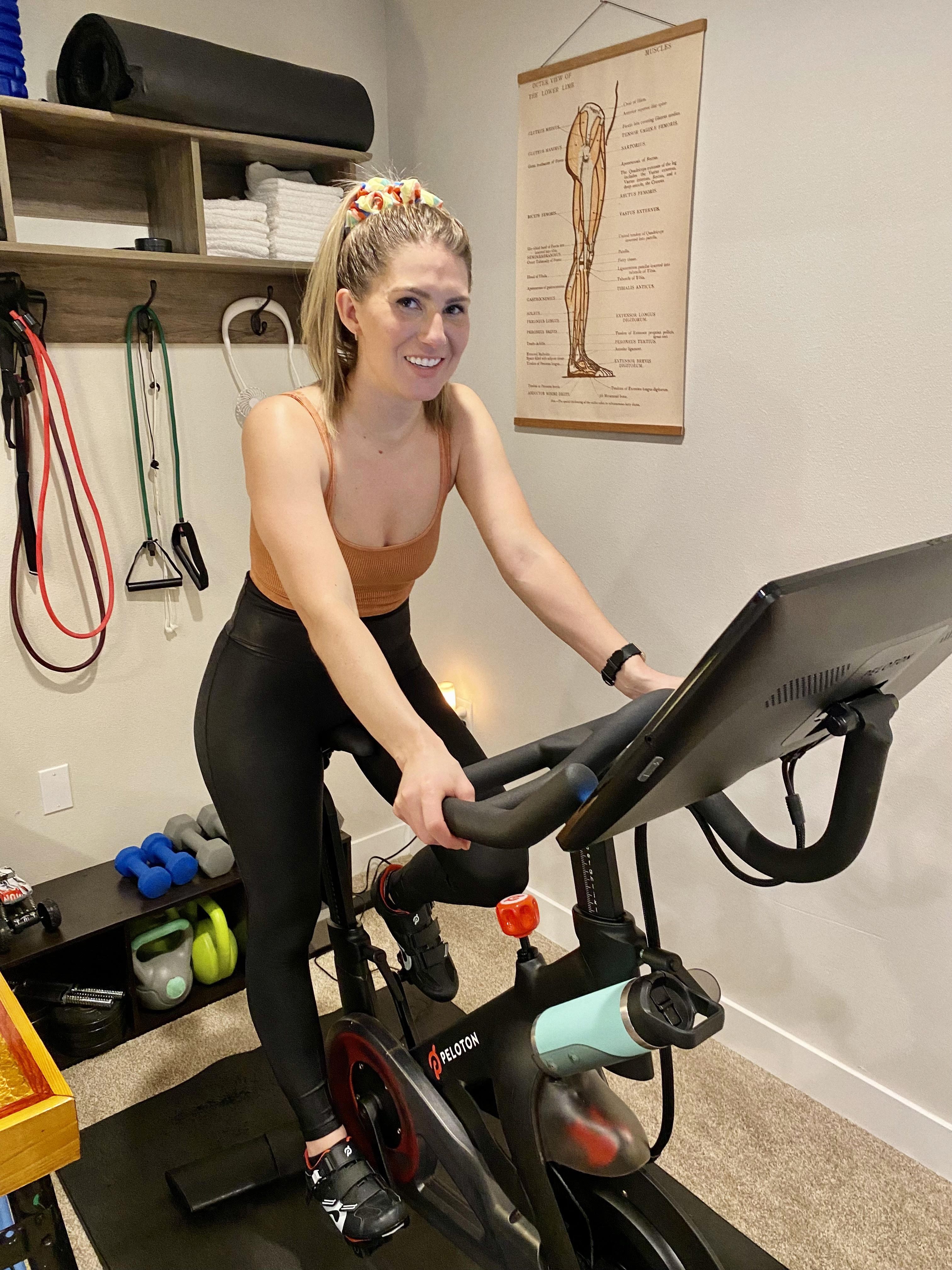
What is your personal workout philosophy?
When an instructor asks that we get in touch with our “why,” I repeat to myself, “Happy and healthy.” I think working out should be joyful and never done in punishment or dread. I like to challenge myself and also sometimes take it easy. We should never judge ourselves for how we show up because that just serves to discourage us.
How has Peloton impacted your relationship with your physical and mental health?
Staying active is the basis for how I care for myself. Every minute logged on the Peloton Bike or App is a minute I am giving to myself. As a mom of young kids, I am always giving to everyone else, but even a quick 20-minute class can completely reset my day. I was not very active prior to getting the Bike, and having that daily habit established (~4 months at the onset of COVID) was how I got through those dark months of daily panic attacks and anxiety, while also trying to be the best mom I could to my kids. I believe staying active and keeping that commitment to myself has been critical to both my physical and mental well-being. My body size fluctuates, but it isn’t about that for me. Exercise keeps my body healthy and keeping my commitment to show up for myself grounds me mentally. I might choose restorative yoga or a challenging ride that day and by honoring those choices I have learned to trust and respect my body in a new way.
Can you think of a time when an instructor said something that really stuck with you?
There are moments in nearly every class where the instructor says something that makes an impact or deeply resonate. They form a kind of mosaic of affirmations that pop into my head throughout my days, but one instructor who inspires me is Emma Lovewell: “Feel the heat and get closer to the flame.” This is applicable to when we physically or emotionally push ourselves. We have to lean into discomfort in order to grow.
What’s something that’s surprised you about Peloton?
I was surprised at how much I would actually enjoy working out. Also when I started I thought I would probably only have a couple instructors I would want to ride with, but actually there is a ride or class for any day or any mood. I didn’t expect to laugh and cry so often!
What accessibility efforts that Peloton has made have the most impact on you?
I appreciate subtitles and in general seeing Peloton show interest in making an ongoing effort to listen to the needs of their community. It isn’t an accessibility effort necessarily, but the Mental Health Day classes and Mood Series classes made me feel heard and seen.
Katie G.
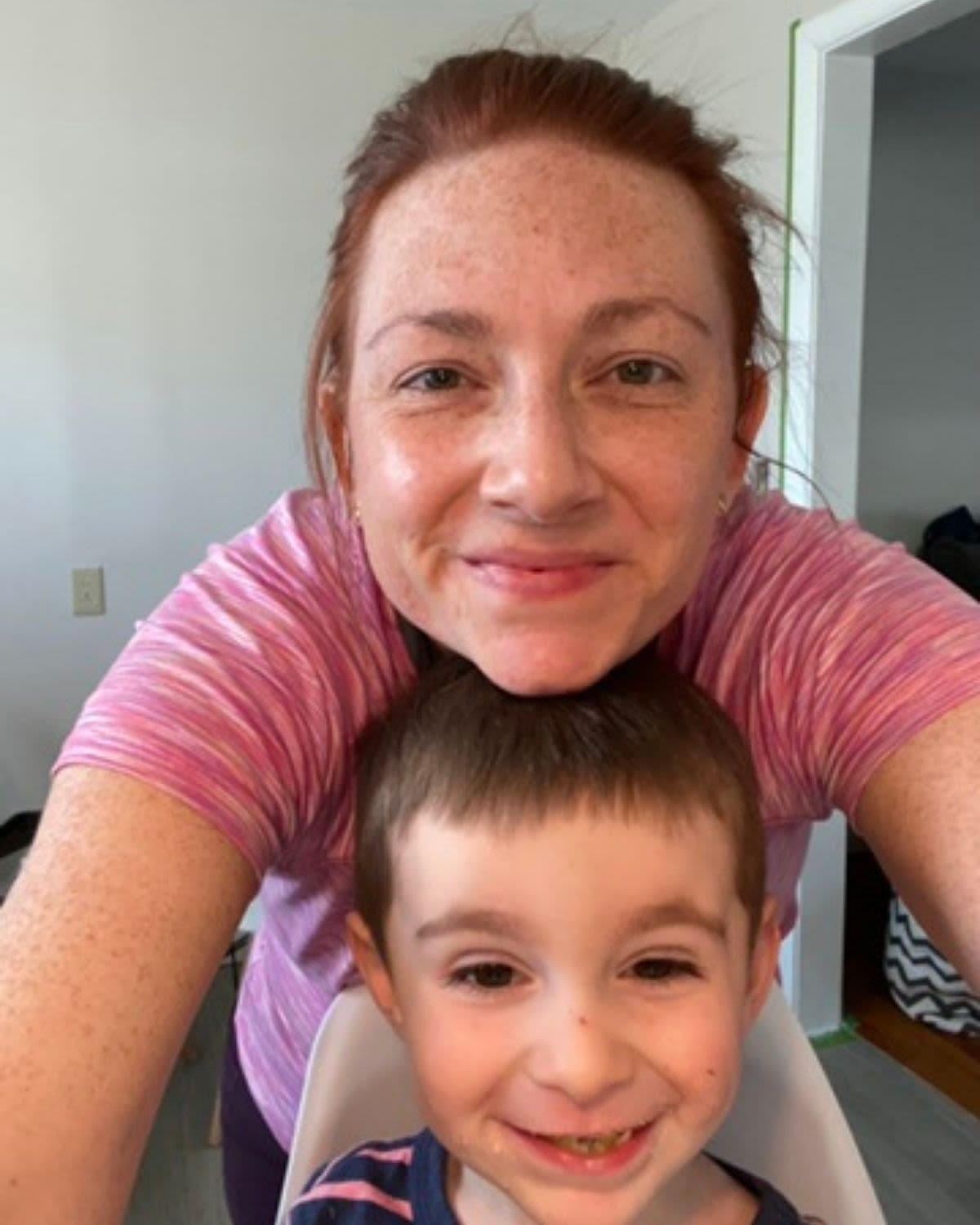
What is your personal workout philosophy?
I have come a long way in my workout philosophy and I am proud to say that right now, my philosophy is that it feels good to move and I should take every opportunity I can to do it. My end goal is health and a better quality of life, not a thigh gap or unattainable waist size.
I have always loved working out and moving my body. I am a better person, mom, employee, friend, wife, and professor when I do. Despite this love of working out, I am the queen of justifications. These justifications are sometimes justified given my multiple disabilities: I have chronic migraine and neuropathy in my left leg, which requires me to wear a leg brace. The neuropathy makes it so that I do not have full feeling in my foot and leg and cannot move certain muscles. Because of the neuropathy, I have a foot drop so the brace I wear corrects that. I have to be careful with the types of workouts I can/cannot do, and the Peloton Bike is absolutely perfect for me without putting too much strain on my legs!
How has Peloton impacted your relationship with your physical and mental health?
The impact being active has on my wellbeing is substantial, huge, major, insert any other synonym here! When I work out, I find that I am more confident in my ability to tackle the day, that I feel stronger in all of my movements, both mental and physical, that I feel lighter mentally and spiritually, and all around, happier. Peloton has made me stronger, more confident, healthier and more motivated.
Can you think of a time when an instructor said something that really stuck with you?
Robin Arzón relates movement to medicine, which I absolutely adore. Denis Morton lets us know that he makes suggestions, we make decisions (I love the autonomy of that), Cody Rigsby tells us to fix our wig and get our lives together and Tunde Oyeneyin says that in order to see the results we have to put in the work, and by showing up, we are putting in the work.
What’s something that’s surprised you about Peloton?
That it has motivated me to work out from home, something I have never been able to do. Also, the diversity of nuance and instructors has been wonderful to witness.
What accessibility efforts that Peloton has made have the most impact on you?
Accessibility-wise, the diversity of the instructors and how relatable they are has made a big impact on me. Their language, the way they explain things, none of it is condescending. It is all both informative and instructional.
Brenda A.

What is your personal workout philosophy?
My philosophy is simple: Anything is better than nothing. Five minutes of light biking or even stretching will leave me feeling better physically and mentally. And oftentimes, those five minutes turn into a longer workout.
How has Peloton impacted your relationship with your physical and mental health?
My disease, Primary Lateral Sclerosis (the much-less deadly and rare cousin of ALS), makes all of my muscles stiffen—from my legs to my vocal cords and everywhere in between. As a result of the progression, I use a mobility scooter for distances and/or a cane depending on the situation. Being active helps keep my muscles looser than they would be otherwise. I’m incredibly lucky that I haven’t seen any further progression of my symptoms in the past three years—and that’s something I partially attribute to being more deliberate about being more physically active.
[With Peloton], my partner can tell when I’ve had a ride. I’m happier and even peppy, even when I’m physically exhausted afterward. I even sleep better when I’ve done a session.
Can you think of a time when an instructor said something that really stuck with you?
Yes! G-d bless Tunde! A bit of a backstory: I received my Peloton as a birthday gift from my supportive boyfriend, Matt (true story: we have the same birthday!). As much as I’d long-admired Peloton from a distance—I already had a stationary bike—I didn’t see myself owning one in the near future. I’ll be honest. It was hard to jump into the first few classes; not because of the instructors or anything related to Peloton, but because my disease limits my cadence—I think I top out at 87 on a fantastic day. It left me feeling defeated and like this product was wasted on me. And then I took Tunde’s beginner class. I will never forget when I heard her say, “All you have to do is finish.” She made it okay to just finish and allow me to feel proud simply for completing a class—even if I didn’t hit the cadences suggested. Her attitude that entire class was that it was not just okay, but encouraged, to do what I needed to do for me and my body. I’m sure other instructors said similar things, but Tunde really spoke to me (maybe it was that we’re both Texas gals). I take her words in that class as my mantra for trying new things in life, and they've helped me make peace with the fact that I may never hit the high cadences. But you better believe I’ll push through any resistance thrown at me!
What’s something that’s surprised you about Peloton?
I didn’t think I’d enjoy Peloton’s sense of community. I’d see commercials of folks “high-fiving” one another, and I’d roll my eyes. Now? Getting high-fives makes my workout session. I’ll proudly share my username with anyone and everyone. I dream of the day I get a shoutout! All of these things make me feel like I’m not alone, even if I am in my bedroom. It’s pretty great.
Ellie G.

What is your personal workout philosophy?
I try to find joy in movement since there are times where I have less mobility and I never want to take my ability to exercise for granted. My workout philosophy is that this is time I take to show myself love and it should be fun.
How has Peloton impacted your relationship with your physical and mental health?
Being active is a very important tool for my physical and mental wellbeing. Being more active through cycling has allowed me to build strength to become more active elsewhere in my life. I would not have the physical strength to enjoy long walks with my partner if I hadn't started cycling regularly.
Can you think of a time when an instructor said something that really stuck with you?
When I first got my Peloton Bike, I did a ride where Christine D'Ercole said to have a Leaderboard name that inspires you, so that's when I changed mine to express how I feel when I take time to ride, or do something else on the platform. I am worthy of taking whatever time I have to show myself love through movement.
What’s something that’s surprised you about Peloton?
How easy it is to just hop on the bike when it's at home. Before, I had to get myself to the gym, which is not always easy when I was low on spoons (not feeling well) due to my illness. Now if I'm having a low-spoon day, I can set up a 15-minute ride or restorative yoga class, and if I'm having a great day, I can enjoy a 45-minute Power Zone class.
What accessibility efforts that Peloton has made have the most impact on you?
I think Peloton is accessible because the wide range of classes, specifically the length of classes, allows me to use Peloton almost every day no matter how I am feeling and have a high-quality workout experience at home.
International Day of Persons with Disabilities
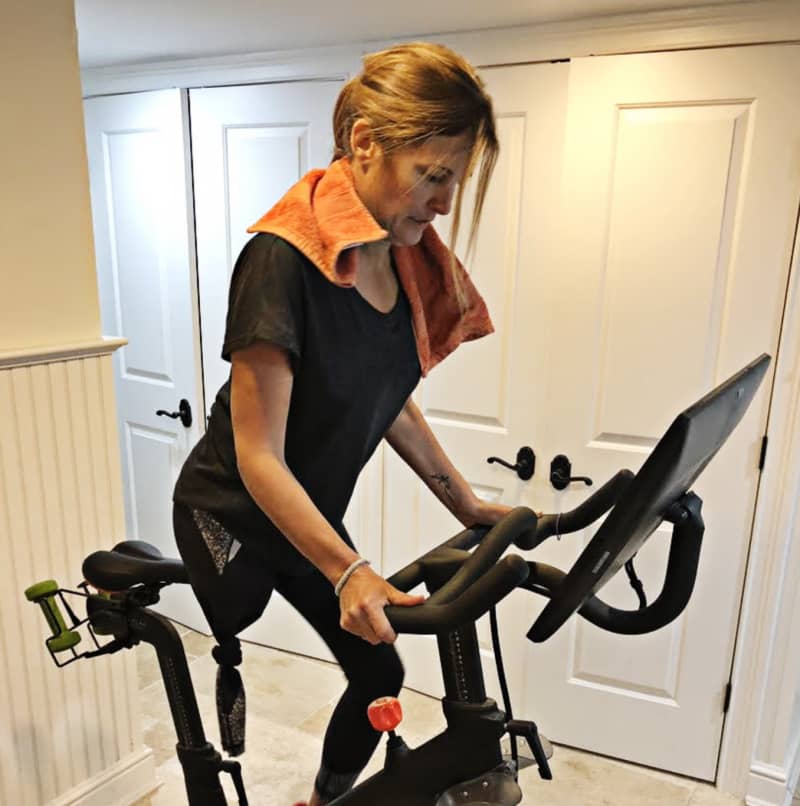
United In Strength: Get to know some of the Peloton members who work out together under Tags like #DisabilityStrong and #MentalHealthWarriors.

Strength, Cycling and Screen Readers: Meet five blind and low vision Peloton Members using assistive technology to reach their fitness goals.
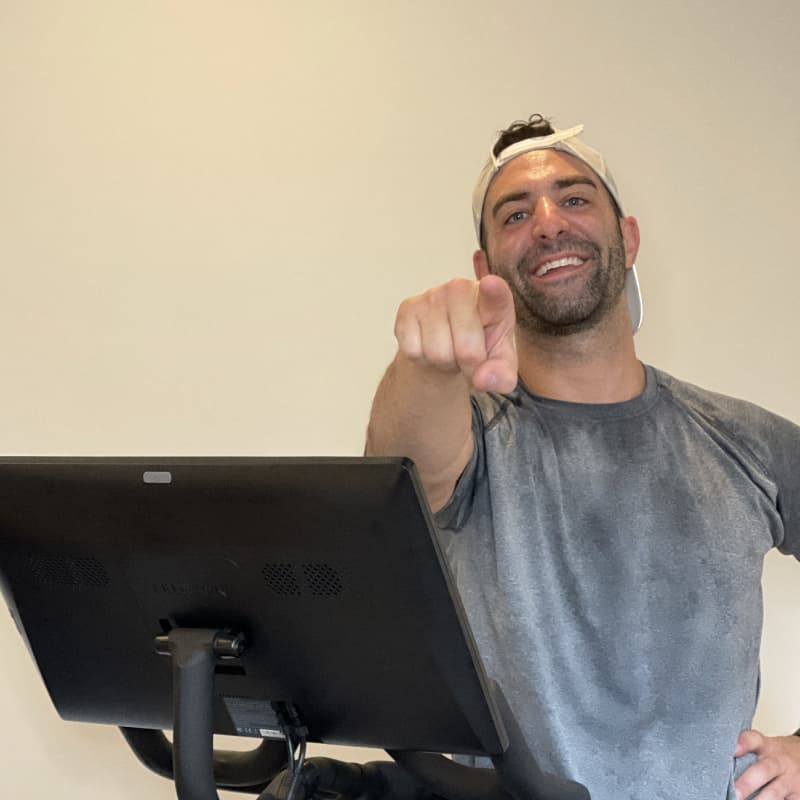
Sweating with Subtitles: Get to know how four deaf and hard of hearing Members are using subtitles to improve their physical and mental fitness.
This content is for informational and educational purposes only and does not constitute individualized advice. It is not intended to replace professional medical evaluation, diagnosis, or treatment. Seek the advice of your physician for questions you may have regarding your health or a medical condition. If you are having a medical emergency, call your physician or 911 immediately.


